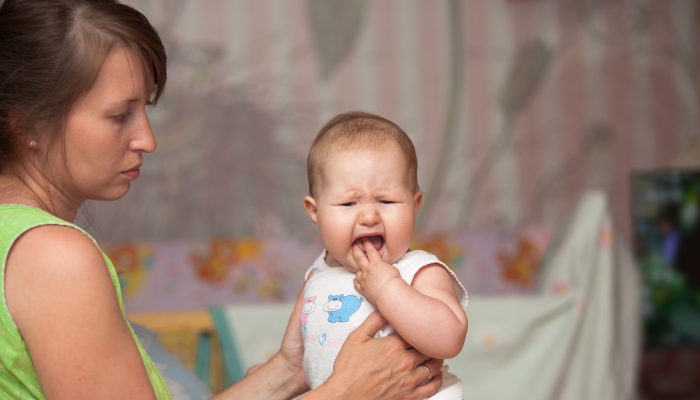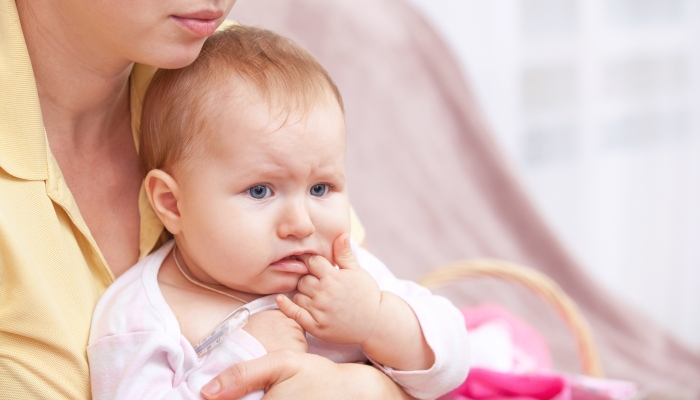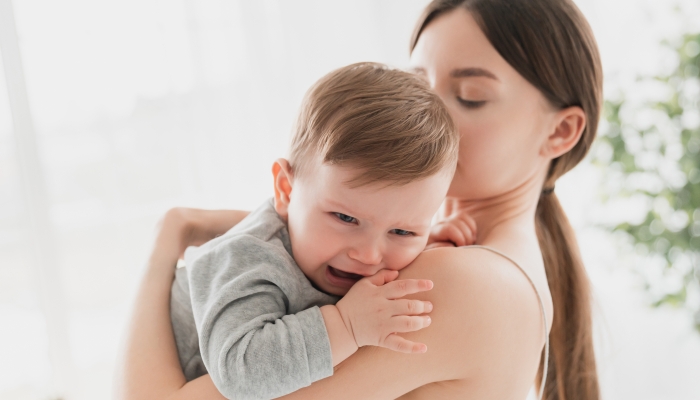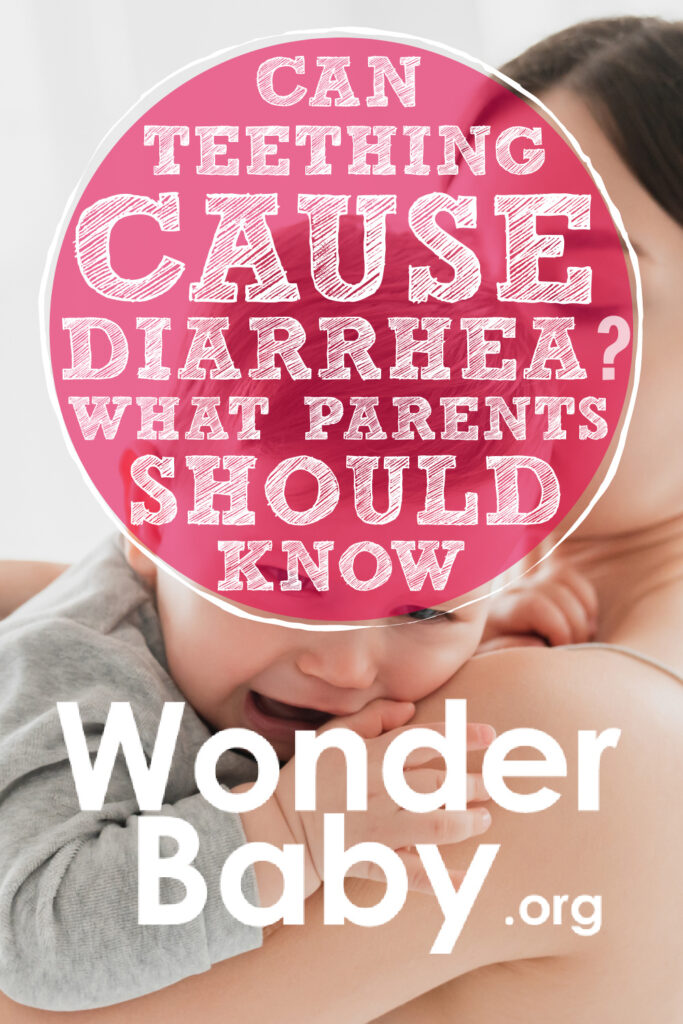Can Teething Cause Diarrhea? What Parents Should Know

- Research suggests that teething and diarrhea are not related.
- Diarrhea in babies can be a sign of other illnesses.
- Babies can easily become dehydrated from diarrhea.
- There are many ways to help your baby who is teething and has diarrhea.
If you were to ask a parent how they knew if their child was showing teething symptoms, they might say:
“Because her skin had a rash.”
“He was drooling all the time.”
“She wouldn’t let me put her down—she was so fussy!”
“My baby had teething diarrhea.”
Cutting teeth is a significant milestone in your child’s life. They will use those baby teeth as they eat nutritious solid foods, which will set them up for healthy food choices for life.
It’s also a big deal for your little one because it’s likely one of the first times they’ve felt unwell. Symptoms of teething start as the tooth bud is formed under your baby’s gums and makes its way to the surface.
Those weeks between the beginning of teething grumpiness and when that little tooth finally emerges can be rough for everyone. Between the fussiness, drooling, and discomfort, it’s no wonder your baby is having a tough time.
In terms of teething symptoms, diarrhea seems to be particularly concerning to parents. What causes baby diarrhea? Can teething itself cause diarrhea? Or could something else be going on?
Can Teething Cause Diarrhea?
The lived experience of many teething children and their parents would suggest the answer is yes. A 2019 study found that, when asked if diarrhea was a symptom of teething, 68% of parents said yes, along with fever and changes in sleep patterns.
However, there is a surprising amount of research that suggests that teething and diarrhea are not related.
Research led by Michael Macknin, MD, in Symptoms Associated With Infant Teething found that increased amounts and frequency of loose stools were not significantly associated with the arrival of first teeth.
Likewise, an article by Sankalp Sood, MDS and Mangla Sood, MD, published in the Journal of Clinical Pediatric Dentistry titled Teething: Myths and Facts, agreed that diarrhea is not caused by cutting teeth.
These facts lead to an interesting question: If diarrhea and teething are not, in fact, scientifically linked, what’s going on?

Why Do Teething Babies Tend to Have Diarrhea?
The developmental milestone of teething also occurs around the same time as another significant event—the formation of a baby’s own immune system through exposure to illness (active immunity).
Passive and Active Immunity
During pregnancy and birth, the mother transfers germ-fighting antibodies to the baby via the placenta (passive immunity). These stores tend to deplete around the age of six to twelve months, which, coincidentally, is also around the time your little one starts to be more mobile.
Your child will also receive some antibodies through your milk if you’re breastfeeding. However, their natural immunity and germ-fighting abilities dip as your baby transitions from passive to active immunity.
Fewer antibodies mean an increased likelihood that your child can become ill.
Illness Caused by Exposure, Not Teething
With the ability to move around and reach things in their environment, it’s not surprising that most items end up in a child’s mouth. These objects could be their fingers, their favorite lovey, or something less desirable. (My kids went for the dog’s toys.) Your little one isn’t trying to drive you crazy—babies bite in an attempt to self-soothe and relieve pain.
Bear in mind that most objects your baby explores carry their own germs. If these items aren’t cleaned regularly, they can grow viruses and bacteria.
When your baby chews, they can make themselves sick through exposure to the microbes on the objects.
To recap: Scientifically speaking, teething doesn’t make your baby sick, diarrhea or otherwise.
However, viral and bacterial contamination from items your baby chews, along with waning inherited immunity, can cause a more serious infection.
Caring For Your Baby Who Is Teething And Has Diarrhea
As parents, we long to soothe and provide relief for our children when they’re in pain or not feeling well. Unfortunately, there’s no fast way to treat diarrhea. There are, however, things we can do as parents to make our little ones more comfortable.
In caring for a baby with diarrhea, it can be helpful to consider the following suggestions.
Continue to Feed Your Baby
It’s important to keep your baby hydrated when they’re experiencing diarrhea.
Breast milk and formula contain water and a variety of nutrients and may be easier for an irritated gut to digest than solid food.
If your baby is starting to show signs of dehydration, your child’s doctor may suggest using an oral rehydration solution (ORS). They are widely available at a variety of stores and can be used to help replace electrolytes lost with frequent diarrhea in babies.
Steer clear of juice or drinks other than ORS that contain added sugar. These are not appropriate for children younger than 12 months and may make diarrhea worse.
Change Diapers Often
Diarrhea is moist and acidic, which can irritate your baby’s skin. Many parents find using plain water on a soft cloth to be effective when cleaning the diaper area. Baby wipes can contain alcohol, which will sting when used on open skin.
Using a cream or ointment to protect the skin while your baby has diarrhea may also be soothing. Look for ointments containing zinc oxide, petroleum jelly, or vitamins A and D.

Caring For Your Baby Who Is Teething
As a parent, it can be frustrating when dealing with a child who is experiencing teething pain. Some babies seem to sail through with a minimum of teething symptoms, while others hit every bump in the road.
Fortunately, there are many options available to provide relief to your baby during the teething period.
- Offer an appropriate chewing option. Putting out the fire to make sore gums feel better can be as simple as a cold spoon or cool wet washcloth. A chilled teething toy can also be a great option.
- Consider a teething necklace. If you choose a necklace that your child wears, make sure it’s removed before naps due to choking and entanglement risks.
- Protect their skin. Exposure to increased saliva production and constant moisture can irritate the skin around the mouth and chin, causing a rash. Consider using petroleum jelly as a way to treat teething rash.
Avoid any remedies containing honey for infants under twelve months due to the risk of botulism. Consult your child’s doctor before using homeopathic or naturopathic remedies. Some contain belladonna or benzocaine, which the FDA warns against because of potential side effects.
When To Worry About Your Baby’s Diarrhea
Water composes about 70% of the human body. Between losing fluid during loose stool episodes and a decreased desire to feed, babies can easily become dehydrated when they’re sick.
It’s time to contact your child’s doctor if your baby shows the following symptoms along with diarrhea:
- Is 3 months or younger
- Fever (100.4℉ or higher)
- Vomiting
- Dry mouth or tongue
- Few or no tears when crying
- Sunken soft spot
- Fewer than six wet diapers a day
- Dark urine (normal is very light yellow)
Call your doctor immediately or seek emergency care if your baby:
- Seems excessively tired or lethargic
- Has not urinated more than once or twice in 24 hours
- Has wrinkled skin
- Has cool, discolored hands or feet
Professional help will be needed to correct dehydration in these situations.
Peer-reviewed studies have helped describe the difference between usual and unusual teething symptoms. While most babies experience at least some signs during the teething period, you’ll be better prepared to recognize symptoms that require medical attention and know ways to help your baby be their healthy best.
FAQs
What are research-proven symptoms of teething?
Common symptoms your teething child might show include:
- Increased drooling
- A facial rash, particularly on the chin or cheeks
- A strong desire to bite or chew objects
- Gum pain
Don’t babies get fevers when teething?
A slight rise in temperature is considered normal. A temperature higher than 100.4℉ is considered an actual fever, which suggests that another illness is happening for your child in the teething period.
Why is my baby pulling their ear?
The nerves around your child’s mouth and teeth reach all the way over to the ears. The development of a new tooth can put pressure on these nerves and cause pain. Children will often rub their ears as a way to try to relieve the discomfort of sensitive gums.
Ear pulling can also be a symptom of an ear infection. Seek professional help if your child is showing other symptoms of illness.

The information WonderBaby provides is not intended to be, and does not constitute, medical or other health advice or diagnosis and should not be used as such. Always consult with a qualified medical professional about your specific circumstances.
Related Posts

Eye Conditions and Syndromes, Visual Impairment
Neuralink Announces Plans to Restore Sight to the Blind with Brain Chip
Elon Musk’s company Neuralink has announced plans to begin human trials of its new “Blindsight” brain chip by the end of 2025.

Health & Nutrition
Can Baby Skin Care Products Expire?
Is that forgotten tube of diaper rash cream still safe to use? Learn more about the expiration dates of popular skin care products for infants.

Health & Nutrition
Boosting Immunity in Kids: 3 Tips for a Healthy Winter
Parents can help boost their kids’ immunity during cold and flu season by maintaining healthy eating, sleeping, and exercising habits in the winter.